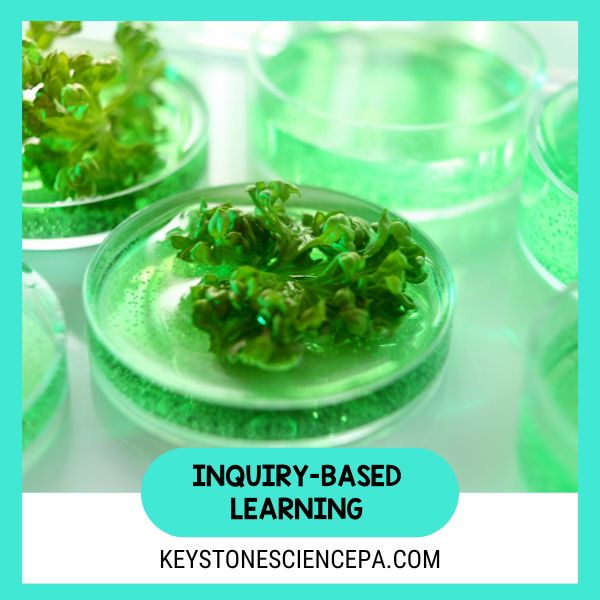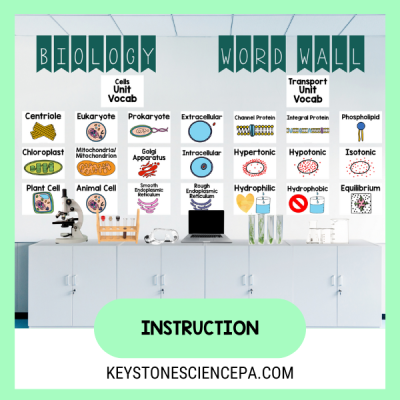Even though the phrase “inquiry based learning” has become a bit of a buzzword, it can be difficult to find rigorous and engaging materials.
Thankfully, inquiry based learning is something you can do no matter what curriculum or materials you have access to.
It’s more about HOW we teach.
It’s an entirely different approach; it’s a mental paradigm shift.
This blog post is the first of a “mini” series of posts that will introduce you to inquiry-based learning, examples, and ways for you to implement inquiry-based learning in your own classroom.
Even if you are familiar with inquiry-based learning you will take away an idea, a strategy, or learn something new, so read on!

What is inquiry-based learning?
Inquiry-based learning is an awesome educational approach that gets students actively involved in their own learning journey. It’s a science adventure where students actually DO SCIENCE, asking questions, investigating problems or phenomena, and seeking answers through hands-on exploration.
Rather than the teacher just pouring out information, inquiry-based learning empowers students to take the driver’s seat. They get to ask thought-provoking questions, dig into the nitty-gritty of problems, and gather evidence to find those “a-ha” moments. It’s all about developing crucial skills like problem-solving, critical thinking, and communication.
Think of it as a way to unlock your inner scientist. You’ll learn how to come up with meaningful questions, conduct experiments, analyze data, and communicate your findings like a pro. The role of the teacher is be there to guide the student, providing resources and support, but students are ultimately leading the charge.
With inquiry-based learning, students not only gain a deeper understanding of scientific concepts, but they’ll also develop a lifelong love for learning. It’s about curiosity, creativity, and the thrill of discovery.
Academic View of Inquiry Based Learning
At its core, inquiry-based learning is an educational approach that prioritizes the active participation of students in constructing knowledge through inquiry and investigation.
Rather than passively absorbing information, learners are encouraged to ask questions, pursue their interests, and explore real-world problems within a structured framework.
In an inquiry-based learning environment, educators assume the role of facilitators, guiding students through the process of inquiry while providing necessary support.
This methodology nurtures critical thinking skills, problem-solving abilities, and a deep understanding of the subject matter.
It promotes an active and engaging learning experience, empowering students to become lifelong learners equipped with essential skills for the dynamic world they will encounter.
5 Key Characteristics of Inquiry-Based Learning
Let’s take a look at the FIVE key characteristics of inquiry-based learning.

1. Student-Driven Exploration
Inquiry-based learning places the student at the center of the learning process.
Students are encouraged to explore their own questions and design investigations, fostering a sense of ownership and autonomy.
It’s a much different method of teaching, learning, and classroom management than most teachers in the United States are accustomed to.

2. Questioning & Problem-Solving
Curiosity is sparked through the formulation of questions.
Inquiry-based learning encourages students to ask meaningful questions, investigate them systematically, and develop viable solutions, honing their problem-solving skills along the way.
Instead of the teacher asking the questions, students are encouraged to be curious and ask their own questions.

3. Authentic and Real-World Contexts
Learning becomes more meaningful when students can connect their studies to real-world situations.
Inquiry-based learning facilitates this connection by encouraging learners to present findings to authentic audiences, research problems related to current events, and learn about phenomena that’s relevant to them.

4. Collaboration and Communication
When we think about 21st-century learning in general, collaboration and communication are critical skills.
These skills are especially important as we move into the age of automation and robotics in technology.
When students engage in discussions, debates, and collaborative projects, they develop skills and experience working in a team – which is helpful no matter which route they decide to take in life.

5. Reflection and Evaluation
Inquiry-based learning emphasizes the importance of reflection and self-assessment.
Students are encouraged to evaluate their learning process, identify areas of growth, and make connections between new knowledge and prior experiences.
Reflection is so important for academic success and personal growth.
Often, in life, people are evaluated by someone else on a list of third-party criteria.
But when we look at the habits of high performers and highly productive people, we see that a great deal of reflection happens – and that strategizing to refine habits and processes comes as a result of these reflections.
When we look at processes like the engineering and design process, and even the scientific method, we can really see this cycle of reflection, planning, experimentation and refining come to life.

Definition of Inquiry-Based Learning
If you’re brand new to inquiry based learning, open this other blog post from Edutopia in another tab or window, because it gives a really comprehensive breakdown.
Inquiry-based learning is an educational approach that emphasizes a student’s role in the learning process and focuses on posing questions, problems or scenarios, rather than simply presenting established facts or a smooth path to knowledge.
If you are eager to learn more, check out the following resources that were used to construct this post:
- Edutopia
- TeachThought
- ASCD (Association for Supervision and Curriculum Development
- Vanderbilt University, Center for Teaching
- Faculty Focus
Your Next Steps
Need more support integrating an inquiry based learning approach into your instruction?
I’d love to help you!
Here are some ways I can support you:
- Sign up for my email newsletter list for tips and ideas every two-ish weeks
- Click here to connect with me on Instagram
- Need lesson plans and activity ideas? Click here to browse my web store













